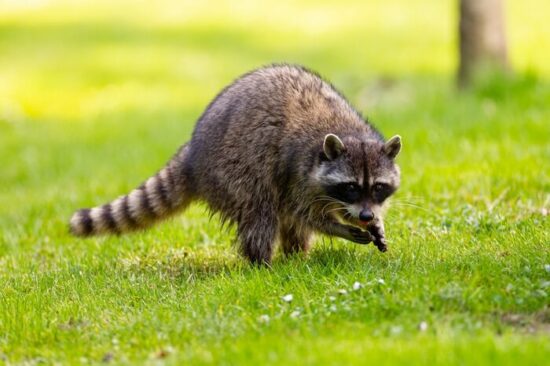Raccoons are resourceful and opportunistic animals that are always on the search for food. But while a lot of people think of them as dumpster divers, raccoons will eat other critters quite often!
This list of what animals raccoons eat will help you understand these creatures better, so you can keep them away from your home.
1. Mice
While people commonly think of a raccoon as an animal that ransacks trash cans in the middle of the night, these critters actually have a varied diet that includes many types of small mammals.
Mice, while not at the top of a raccoon’s favorite snack list, often make up part of their diet. While a raccoon will eat mice, it’s usually not their first choice. They often prefer another source of food, but will eat a mouse if they can’t find anything else.
Raccoons are not very energetic hunters, and if they do eat a mouse, it’s often a dead one that the raccoon finds while out scavenging. A raccoon will also prey on baby mice in a nest or on mice that are sick or wounded. If a raccoon does attempt to catch a mouse, it is often something they will do out of pure boredom. They may even store it for later in the same way that a cat will.
Despite the fact that mice are not a raccoon’s top prey, they will still catch and eat them. If you have a mouse infestation or increased mouse activity in and around your home, you may also begin to notice more raccoons hanging out. Just remember, however, that raccoons should never be considered as rodent control. Raccoons can bring their own special set of health and nuisance issues.
We highly suggest calling in a pest control company if you think that you are dealing with a mouse or raccoon problem. Never attempt to handle this kind of situation on your own. Both animals bite, and they both can transmit a variety of diseases.
2. Squirrels
Squirrels, common backyard visitors and notorious thieves of bird seed, are quick and nimble climbers. While raccoons can climb trees, they are not the speediest or most graceful climbers. So, it may be surprising that raccoons do eat squirrels.
Squirrels, topping off at a speed of about 20 miles per hour, are often just too fast for a slower raccoon to catch. Most of the time, if a raccoon is eating a squirrel, it’s because the squirrel was sick, already dead or is a baby found in a nest.
When a raccoon is very hungry, and squirrels are the only item on the menu, then a raccoon will take the time to try hunting and killing a squirrel. Because squirrels are so fast, raccoons will use stealth and then their brute strength. Raccoons can easily overpower and take down a squirrel once they catch it. Usually though, squirrels are a meal of last choice.
Squirrels are often attracted to the seed found in bird feeders, so if you notice increased raccoon activity due to more squirrels in your yard, then you may want to consider taking down your feeders for a while. If the situation gets out of control, then seek help from an animal control specialist.
3. Fish
Squirrels and mice may not be a raccoon’s favorite snack, but fish are definitely near the top of the list. Fish are chock full of helpful nutrients that raccoons need such as protein, omega 3 and omega 6.
While raccoons are surprisingly good swimmers, they are not going to swim into the middle of a lake or pond to catch their dinner. Raccoons are animals that are not known to expend unnecessary energy, so their fishing strategy involves sitting near the shallows and waiting for their meal to come to them.
Once the fish swims into more shallow water, the raccoon is quite adept at making the snatch and grab. Raccoons will also eat fish that are injured or even ones that are dead on the shore.
Raccoons will also think nothing of raiding your backyard fish pond. Koi, goldfish, sunfish and other fish are all fair game, so your backyard pond is going to need extra protection if you have raccoons in your area. Don’t forget that raccoons are master burglars, and their sharp claws act like lock picks. There are lots of ways to protect your beautiful fish, so choose the one that’s best for you.
Some things you may want to try include:
- Setting up an electric fence around the perimeter of your pond.
- Sprinkling cayenne pepper spray around the pond.
- Solar powered LED lights that come on at night. These lights are designed to look like a predator’s eyes.
- Placing special netting over the pond.
4. Snakes
Most raccoons are not going to go out of their way to catch and eat a snake, but if the opportunity presents itself, they might give it a try. This is especially true of snakes that live near a water source (a raccoon’s favorite habitat area).
If you’ve started to notice a pattern about raccoons, it’s that they are not the most ambitious animals around. They eat other animals, but they are not very motivated hunters. They prefer to forage around for their next meal.
This pattern shows up again when it comes to snakes. Raccoons eat snakes that are alive if they’re desperate and hungry, but they would rather dine on a snake that’s already dead, a snake that is sick or injured, or even snake eggs. Baby snakes make easy prey for a raccoon and can provide raccoons with an important source of protein and other nutrients.
5. Rabbits
While raccoons will eat rabbits (especially wild ones), they’re not a very common part of a raccoon’s diet. In most cases, a raccoon is no match for the speed and agility of a rabbit, but a very hungry raccoon may attempt to catch and eat one. Raccoons will also eat rabbits that are sick or injured, baby rabbits in a nest or rabbits that are already dead.
Even using stealth and ambush, a wild rabbit is pretty hard for a raccoon to catch. A rabbit in a backyard hutch, however, is very easy prey for a raccoon. Unless the hutch is well protected, a hungry raccoon will have no trouble breaking in and killing one, and often more, of these rabbits.
If you keep pet rabbits outside, we highly recommend making it a habit to bring them inside at night. Raccoons are mostly nocturnal hunters, and rabbits in a hutch are often too tempting for a raccoon to pass up.
Bringing your rabbits in every night may not be an option, so you are going to need to use a hutch with a raccoon-proof design. The usual chicken wire hutch is not going to cut it where raccoons are concerned, and something much sturdier is going to be needed.
Make sure that your rabbit hutch has strong, reinforced wiring, heavy-duty locks and bolts and a sturdy roof. The hutch should be about one foot off the ground and placed in an area where an attack is the least likely. Make sure that the hutch is constructed from sturdy, chew-proof materials.
6. Clams
Even though raccoons are often found in suburban areas where they have easy access to trash cans, their favorite place to hang out is around rivers, streams, lakes and ponds. Raccoons really seem to come into their element around water, and they are very adept hunters of the shallow areas.
Clams, bursting with nutrients like Vitamin B12, omega 3, iron and other essential minerals, can be an important part of a raccoon’s diet. Slow and easy to catch, clams are the perfect grab-and-go snack for raccoons that live in wet, woodland areas.
Raccoons have long, sharp claws that are great for digging in the sand in search of these tasty bivalves, and these claws also act like can openers for prizing open tough clam shells.
7. Frogs
Like clams, frogs are simply full of lots of things that raccoons need such as protein, zinc, iron, Vitamin B12 and omega-3 fatty acids. Unlike clams, however, frogs are significantly harder to catch despite a raccoon’s prowess in shallow water. This is why frogs do not always make up a large part of a raccoon’s diet. However, frog eggs and immature frogs are easier to catch than adults, so a raccoon may be more tempted to snack on them.
In addition to aquatic frogs, raccoons eat frogs that they find on land from time to time. Of course, raccoons will also eat dead frogs that they may find during their daily foraging and scavenging.
8. Birds
Unless you have a hen house or keep other domestic birds in your yard, you may not know that birds are on the list of foods that raccoons enjoy eating. Wild birds, unless they are dead, are not really within the realm of a raccoon’s hunting ability. However, chickens, ducks or even geese are all fair game if they are kept in a coop or pen.
In fact, raccoons are notorious raiders of coops, and they will even go for any poultry they may find wandering around the yard. Raccoons eat birds of the domestic variety because they’re such easy prey. A raccoon may kill several birds in one go, and owners can wake up to a total massacre in the coop.
Just like with rabbits in an outside hutch, extra precaution should be taken to protect poultry from marauding raccoons. There are lots of predator-proof coops and fence options. All fences should have a raccoon-proof top, and the in-ground parts of the fencing should be deeply buried to prevent a raccoon from digging under the fence.
Even though raccoons may not really go after adult birds in the wild, they will, however, make quick work of baby birds or bird eggs in a nest. Wild birds that come to feeders may also be vulnerable as they are feeding. To protect the birds that come to your yard, move the feeder away from trees and other things that are easy for raccoons to climb.
9. Turtles
Turtles, both wild and domestic, are vulnerable to a raccoon attack. Raccoons are very comfortable around water, especially shallow water where turtles like to bask in the sun. Turtles are not known for their speed, and they are easily caught by a determined and hungry raccoon. Even if the turtle goes into its shell, a raccoon’s long, sharp claws will make short work of getting the turtle out.
For anyone who has turtles or tortoises in a backyard pond or enclosure, the danger from raccoons is real. In fact, raccoons may be the number one danger to pet turtles and tortoises. They will not only go after adult turtles, but they will quickly devour both young turtles and eggs. A hungry raccoon can, and usually will, kill and eat all the turtles in your yard in one night.
There are several methods that are commonly used to protect pet turtles from raccoons and other predators. Let’s take a quick look at a few of them.
1. Some people choose to use a low voltage electrified fence. This type of fence is not meant to kill the raccoon, but it will deliver a painful shock. An electrified fence is not for everyone. You may not want to use this option if you have young children, or if you are uncomfortable with the thought of shocking the raccoon.
2. There are a few different kinds of ultrasonic pest deterrent systems out there, and they offer various degrees of success. The theory is that different frequencies repel different predators. It’s best to place several of these around the yard.
3. You can also try motion triggered lights, blinking lights that look like eyes, Have A Heart traps and decoys.
10. Crayfish
Crayfish are yet another aquatic creature that raccoons can’t seem to get enough of. In fact, raccoons are such well-known crayfish consumers, that there is even an old Iroquois legend about a raccoon and a crayfish.
These miniature crustaceans can be found in lakes, ponds, rivers and streams all across the country, and they tend to hang out under rocks and fallen logs in shallow areas. Even though they are able to scoot out of sight fairly quickly, they are not very good swimmers and are easy prey for raccoons.
Crayfish make a tasty, crunchy and nutrient filled snack, and raccoons will gobble up as many as they can get in one meal. This is important to know if you have crayfish in a backyard fish pond or water feature.
There are a few things you can do to try to keep neighborhood raccoons from eating all of your crayfish. Many people find it helpful to put up some kind of pond netting. It may not be the most aesthetically pleasing, but it will help to protect the creatures in your pond from invading raccoons.
You can also try to create caves using old buckets or small bins. This method sometimes works to keep crayfish hidden from the raccoons. However, raccoons are pretty smart, and this method is best used with netting and other precautions.
11. Rats
Rats may not top the list of a raccoon’s favorite food items, but raccoons will eat rats if given the right opportunity. Most of the time, if a raccoon is eating a rat, it’s usually one found in an urban or suburban setting. Both rats and raccoons are scavengers that eat garbage, and this similarity will often bring them into close contact.
Rats are destructive and invasive rodents that can cause damage to your home and property. However, if you’re thinking that having raccoons around will be a free rat control solution, then you need to consider how aggressive and dangerous raccoons can sometimes be.
Having rats and raccoons in your yard or in your home is a huge problem that should be dealt with by a pest control specialist.
12. Snails
We’re sure that by now, you’ve noticed that raccoons don’t like to expend a lot of energy while looking for food. They will ambush and hunt their prey if it is necessary, but they would rather go for something dead or something that is slow and easy to catch. This trend is actually an important survival tactic, especially in the winter when conserving energy is important.
Snails are full of stuff that’s good for raccoons such as protein, vitamins and minerals, and these mollusks provide an important source of phosphorus and magnesium in their crunchy shells. Due to their slow speed, snails are super easy to catch, and raccoons can really fill up on this tasty and nutritious snack.
Raccoons are not picky, this is pretty obvious since they raid garbage cans, and they will eat any kind of snails they can find. So whether it’s a garden snail or one found in and around a water source, a raccoon will go for it.
Conclusion
Now that you know what animals raccoons eat, you can use this knowledge to create a more effective pest control strategy. Being aware of food sources is one of the most valuable bits of knowledge a homeowner can have when it comes to getting rid of specific animals, and that’s no different with raccoons.
Let us know if you have questions about any of the animals on this list. We’re always happy to help.


